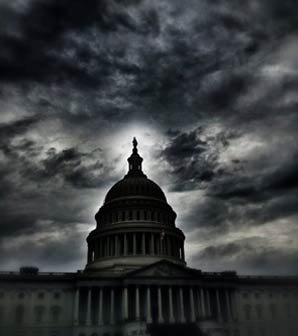
If the virus is still active on Election Day, they worry that could devastate turnout, leading to widespread doubt the outcome reflects the will of the people and damaging faith in the electoral process even more than potential Russian hacking and disinformation. Concerns are rising as seven states have already delayed their presidential primaries because of worries about the health of voters and elderly poll workers.
But, as with the fight against Russian election interference, the move to allow states to hold elections by mail is sparking an ideological battle between Democrats who want to require that states dramatically increase such capabilities and Republicans who consider such top-down mandates government overreach.
The battle over election funding is just one of many sticking points holding up the unprecedented $1.8 trillion rescue package as lawmakers scramble to respond to the pandemic. Senate Democrats blocked a vote on the bill Sunday night out of concern it tilted too far in favor of businesses and lawmakers will be negotiating again this morning.
The price tag for a nationwide vote-by-mail system would likely land between $982 million and $1.4 billion, according to a Brennan Center for Justiceanalysis. The center estimated it would cost about $2 billion to also make other election improvements such as expanding early voting, maintaining safe in-person voting and making online voter registration easier.
House Democratic leaders are developing a measure including "billions of dollars to expand early voting, increase access to vote by mail, provide for emergency vote by mail and increase access to voter registration," a Democratic aide said.
The current Senate bill, meanwhile, includes just $140 million in grants for state and local election officials to "prevent, prepare for and respond to" the virus - but it doesn't specify how that money should be spent.
"There are a lot of things that one side or another might not be comfortable with under normal circumstances that become politically possible in this crisis. I hope this will be one of them because no one has an interest in the November election being less than 100 percent credible," Rep. Tom Malinowski, D-N.J., a leader of the House effort, told me.
Advocates fear if states can't start preparing for a massive nationwide vote-by-mail-operation now, there won't be another chance before November.
"Very little is going to get done in the next couple of months that isn't directly related to fighting this epidemic, so it's important to get it into this must-pass bill," Malinowski said. "There are a lot of things we can postpone as we hunker down to address this crisis, but the one thing that we absolutely cannot postpone is the November elections."
State and local election officials are already clamoring for more money.
In a letter sent Sunday night to House and Senate leaders, 19 election officials including Democratic secretaries of state from Colorado and Arizona call the $140 million in the Senate bill far too little to manage the necessary changes to run the 2020 election during the coronavirus outbreak.
The local election officials who signed the letter include both Democrats and Republicans from Texas, Arizona, Colorado, Missouri, Pennsylvania, California and Ohio, among other states.
"We urge you to include substantial funding in the coronavirus stimulus package so that we have the ability and resources to ensure that our voters can participate safely and with confidence in our elections," the letter, which was organized by New York University's Brennan Center, states.
Every state offers some voters an option to mail in ballots, and over half of them allow anyone to mail in a ballot without providing an excuse, such as being in the hospital or out of town on Election Day. Only three states offer mail-in voting as a default, however, and it will require a major bureaucratic lift to establish broad mail-in voting across the nation by November, as my colleagues Amy Gardner and Isaac Stanley-Becker report.
The to-do list includes machinery to print huge numbers of paper ballots, high-speed scanners to count filled-out ballots and a totally revamped security system to ensure no one tampers with the ballots between people's homes and election offices. In some cases, states that don't offer no-excuse mail in voting would also have to change their constitutions to do so, Amy and Isaac report.
And unlike securing elections against Russian hacking with new paper trails for votes and post-election audits, which has taken place over three years, the shift to mail-in voting would have to happen over just seven months.
Senate Democrats are also pushing to expand voting by mail.
Sens. Amy Klobuchar, D-Minn., and Chris Coons, D-Del., sent a letter to leaders in both chambers pushing for their vote-by-mail bill, the Natural Disaster and Emergency Ballot Act to be included in the stimulus package. That bill would require states to offer a mail-in voting option to all their citizens and provide $325 million to help handle the added workload.
"Protecting the right to vote is critical - and we can't let this crisis stop Americans from being heard at the ballot box," the senators wrote.
"This pandemic has already strained state election systems to the breaking point. Expanding vote by mail and early voting will cost a tiny fraction of any relief package, but could very well be the difference between orderly elections and total chaos," Sen. Ron Wyden, D-Ore., another sponsor of the bill, told me in an email.
Leaders of the Democratic National Committee and Democrats' House and Senate campaign committees endorsed the bill in a USA Today op ed this weekend along with leaders of Democratic associations of mayors, attorneys general and secretaries of state.
The advocacy group Stand Up America is also rallying public support for the bill and organized roughly 40,000 calls to members of Congress on the issue last week, the group said.
Sign up for the daily JWR update. It's free. Just click here.
(COMMENT, BELOW)


 Contact The Editor
Contact The Editor
 Articles By This Author
Articles By This Author